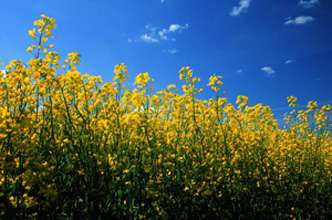Do you have GMO’s in Mountain Sky products?
Yes and NO!

Canola flowers in Canadian field. Canola is a part of the Brassica family related to broccoli and kale.
We add Canadian canola oil (94% GMO grown) to our bar soaps and liquid soaps because it has similar skincare qualities to olive oil. Both olive oil and canola oil have a similar fatty acid profile. Canola oil is considered GMO free as the GM protein is in the husk part. Many canola plants are genetically modified via biotechnology; however, the oil of herbicide-resistant varieties are identical to the oil of conventional canola. The oil itself contains no GM material. The transgenic gene in many canola varieties is a protein, and all the protein is removed from canola oil during processing. Therefore, no GM material remains.
Many companies claim they have GMO free products because the actual GM gene is no longer in the extracted process. However, they are still deriving the product from a GMO plant. Read more HERE
We also add citric acid in our liquids soaps which is produced from fermenting a genetically modified Apergillus mold with sugar products such as corn (88% GMO). Citric acid does not contain any GM products as it is a byproduct of the fermentation process of the mold and sugar product.
Many people incorrectly believe that citric acid is derived from citrus fruits; citric acid is produced in large scale chemical manufacturing plants.
If the product that you are selling is a byproduct of processing with a GMO agricultural product, is your product really GMO free?
GMO free is a marketing strategy and a claim that is not based in science, or anything that makes the actual product healthier for people or the environment.
All modern agricultural products have been genetically modified by humans for our benefit. Humans have been selecting certain traits in agricultural products by picking the seeds from plants that show particular gene modifications. We pick plants that are bigger, better tasting, and store longer, since we started planting seeds over 10,000 years ago.
We pick the tomato that ripens earlier and tastes better, so we select that tomato seed. We keep planting that particular seed, and then we pick again for the genetic modification that we prefer. Over several decades or centuries, we get a tomato plant that grows the type of tomato we want. We have chosen certain genes that taste better, ripen earlier, resist certain diseases, etc. However with better technology, plant breeders can create plants that resist drought, have better nutrition and can resist certain pests quicker. Rejecting genetic engineering would be similar to rejecting x-ray technology. Do you really want the doctor to guess how your bone is broken, or do you want to use modern technology such as an x-ray?
We have manipulated all of our agricultural products genetically. Human agriculture started approximately 10,000 years + ago. The original plants that we harvested as hunter gatherers did not look anything like the products that we grow in our modern agricultural systems. We would all starve to death if we went back to the original plants. Many people wax poetically of traditional lifestyles, but most people would not want to go back to a feast and famine standard of living.
Much of our modern food has been genetically modified through plant breeding processes such as chemical mutation and radiation mutation. These types of mutation breeding has produced thousands of useful plants and a sizable fraction of the world’s crops…including varieties of rice, wheat, barley, pears, peas, cotton, peppermint, sunflowers, peanuts, grapefruit, sesame, bananas, cassava and sorghum. And many of these crops can be certified organic and will be found in your local health food store.
All of our selective breeding of plants over ten thousand years have not been scientifically controlled or tested for safety. When a plant is bred for certain qualities for taste and rigor, we don’t know what other genetic material comes along with the superior taste gene.
For instance, kale, broccoli, cabbage, cauliflower, brussel sprouts, turnips, rutabaga, collard greens and rapeseed oil and canola oil evolved from one type of wild mustard plant. These agricultural plants are part of the Brassica genus of plants in the mustard family.
It took thousands of years of human agricultural systems to develop one mustard plant to the many varieties we have now.
Brassica oilseed varieties are some of the oldest plants cultivated by humanity, with documentation of its use in India 4,000 years ago, and use in China and Japan 2,000 years ago.
Canola was developed through conventional plant breeding from rapeseed, an oilseed plant already used in ancient civilization as a fuel. The word “rape” in rapeseed comes from the Latin word rapum meaning turnip. Turnip, rutabaga, cabbage, brussels sprouts, mustard, and many other vegetables are related to the two natural canola varieties commonly grown, which are cultivars of Brassica napus and Brassica rapa. The change in name serves to distinguish it from natural rapeseed oil, which has much higher erucic acid content.
Why do you need to put canola oil in the soaps?
We add canola oil in our soap because it has similar qualities to olive oil and it is grown right here in Canada, actually in Alberta which is the next province. Sunflowers are extensively grown in Canada, but the sunflowers seeds are mainly used for sunflower snack products, not oil production. Most sunflower oil found in Canada is from either Argentina, Ukraine or Turkey.
If we look at the big picture of environmental concerns, we need to also examine what we use to manufacture consumer products. Coconut oil and palm oil are brought in by big ships from across the ocean while canola oil is driven here from the next province. It makes environmental sense to use canola oil in our soap. Canola oil has a lower carbon footprint compared to bringing in more oil from Asia. What would you choose to do?

